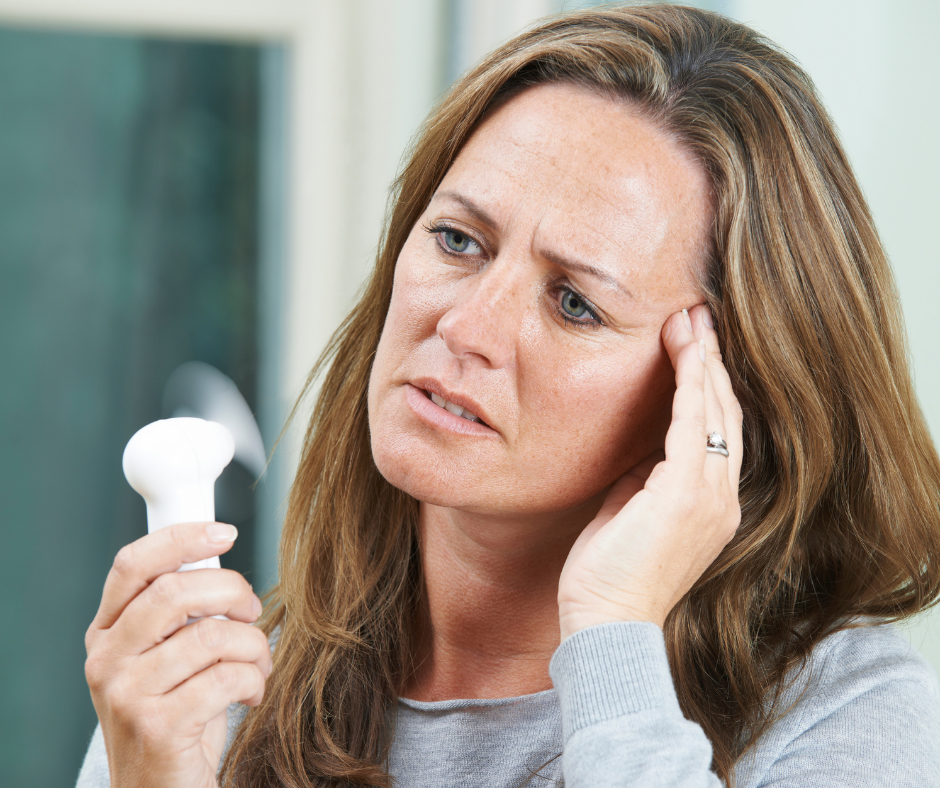5 Foods to Reduce Menopause Hot Flashes

Understanding Hot Flashes during Menopause
While hot flashes are a normal part of the menopausal transition, choosing these foods can help reduce their frequency and severity.
Hot flashes are one of the most common symptoms during the menopause transition—about 80% of women experience them for an average of 7-9 years. Hot flashes are characterized by sudden waves of intense warmth, often accompanied by flushing of the face, excessive sweating, and a rapid heartbeat. These episodes can be quite uncomfortable and disruptive to your daily life, affecting everything from your sleep to your ability to give a presentation at work.
Let’s explore five foods to help alleviate hot flashes and those you may want to avoid.
These 5 Foods Can Help Your Menopause Hot Flashes
Flaxseeds
Flaxseeds are an excellent source of lignans, a type of phytoestrogen. Phytoestrogens are estrogen-like compounds found in plants that can soften the impact of declining estrogen during perimenopause. Incorporating flaxseeds or flax oil into your diet may help reduce the frequency and severity of hot flashes. You can add flaxseeds to your smoothies, sprinkle them on cereals or yogurt, or use flaxseed oil in dressings and sauces. The nutrients in ground flax seeds are easier for your body to absorb than whole flaxseeds.
Soy
Soy products such as tofu, tempeh, soy milk and edamame contain compounds called isoflavones which are also phytoestrogens. Several reviews have supported the conclusion that adding soy to your diet can reduce hot flashes. A 2021 study found that adding a half cup of soybeans to a low-fat plant-based diet reduced moderate to severe hot flashes by 84%.
Soy isoflavones can take several weeks to months to have an effect on hot flashes, so you may need to be patient.
Fatty fish
Fatty fish like salmon, mackerel and sardines are rich in omega-3 fatty acids. These healthy fats have anti-inflammatory properties and may help regulate hormonal balance. Including fatty fish in your diet can provide a healthy source of protein, micronutrients and potential relief from hot flashes. Aim for two servings of fatty fish per week, as recommended by the American Heart Association.
Whole grains
Opt for whole grains such as brown rice, quinoa, and whole wheat bread instead of refined grains. Whole grains have a lower glycemic index, meaning they are digested more slowly and provide a steadier release of energy. Avoiding the blood sugar spikes (and crashes) from refined grains and sugars can help reduce the likelihood of a hot flash.
Colorful fruits and vegetables
Fruits and vegetables, particularly those rich in antioxidants, micronutrients and phytochemicals, are a vital part of a healthy diet for peri- and postmenopausal women. Brightly colored options like berries, leafy greens, citrus fruits, and cruciferous vegetables are especially beneficial. These choices, including broccoli, cauliflower and brussels sprouts, offer anti-inflammatory properties that may help alleviate hot flashes.
Common Triggers of Hot Flashes and Which Foods to Avoid
While certain foods can help reduce hot flashes, there are also common dietary triggers that can worsen or increase their frequency. Being aware of these triggers can help you make informed choices to manage your symptoms effectively.
- Caffeine and alcohol dilate blood vessels and stimulate the central nervous system, potentially intensifying hot flashes.
- Spicy foods can trigger your body to feel hot, which can also contribute to the onset of hot flashes.
- Refined sugar. High blood sugar, insulin resistance and metabolic syndrome have been linked to a higher incidence of hot flashes in menopausal women.
- Heavy meals. Eating a big meal or one with heavy foods that take longer to digest may cause more hot flash activity, especially if you’re eating it in the evening before sleep.
Hormonal Changes and Hot Flashes
Hot flashes are closely linked to the hormonal changes that occur during menopause. As estrogen levels decline, the hypothalamus, a part of the brain responsible for regulating body temperature, can become more sensitive. This increased sensitivity can result in the body overreacting to minor temperature changes, leading to hot flashes.
While dietary adjustments can offer relief, it’s essential to understand that hot flashes are a complex interplay of various factors, and individual experiences may vary. Menopausal hormone therapy (MHT) and some non-hormonal medications are available if you need additional support. Consulting with a healthcare professional can provide personalized guidance and treatment recommendations based on your specific needs.
Lifestyle Changes to Reduce Hot Flashes
Beyond dietary modifications, there are other lifestyle changes you can incorporate to help reduce the frequency and severity of hot flashes:
Dress in layers
Wearing layered clothing allows you to easily remove or add layers as needed to manage temperature fluctuations. Natural, breathable fabrics like cotton can be particularly helpful.
Stay hydrated
Drinking plenty of water throughout the day can help regulate body temperature and reduce the intensity of hot flashes.
Practice stress management techniques
Stress can trigger or worsen hot flashes. Engaging in relaxation techniques such as controlled breathing, meditation, yoga, or mindfulness exercises may help manage stress levels.
Regular physical activity
Engaging in regular exercise such as walking, swimming, or cycling can have a positive impact on hot flashes. Exercise helps regulate hormones, improves sleep quality, and boosts overall well-being.
Maintain a cool environment
Keeping your environment cool, using fans or air conditioning as needed, can help reduce the likelihood of hot flashes and help you better cope with those that do occur.
Each woman’s journey through menopause is unique. By making informed dietary choices, avoiding common triggers, and adopting healthy lifestyle habits, you can effectively manage hot flashes and improve your overall well-being during this transition. Embrace self-care and seek support from healthcare professionals who can guide you through this transformative period in your life.
Looking for more expert support on menopause stages, symptoms and strategies for relief? Download the Midday menopause app from the App Store or visit us at Midday.Health.
Sign up for more unique women’s health content
By submitting this form, you agree to the Lisa Health Privacy Policy and Terms of Use


